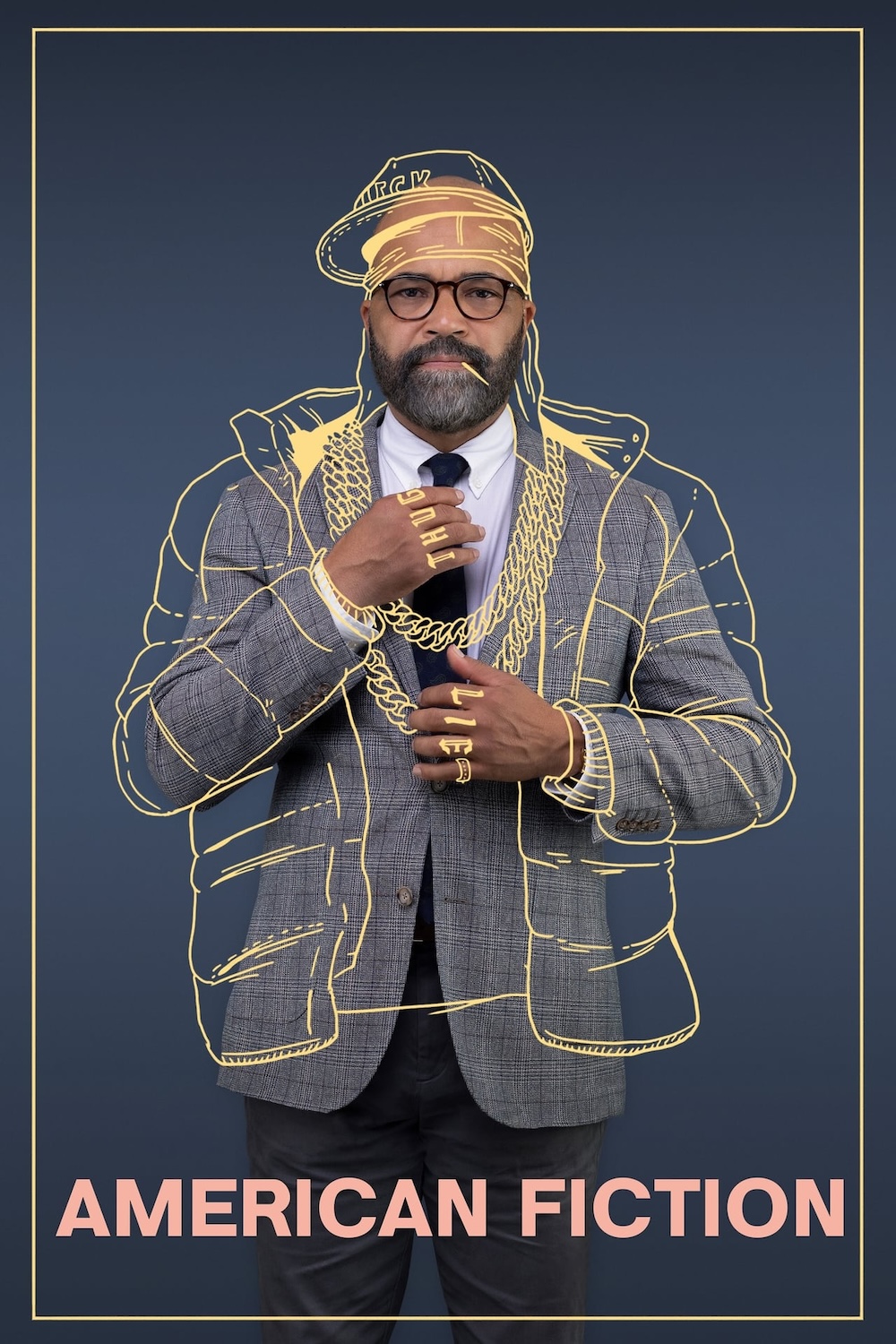AMERICAN FICTION (2023)
A novelist fed up with the establishment profiting from "Black" entertainment uses a pen name to write a book that propels him into the heart of hypocrisy and the madness he claims to disdain.

A novelist fed up with the establishment profiting from "Black" entertainment uses a pen name to write a book that propels him into the heart of hypocrisy and the madness he claims to disdain.


Emmy-winning writer Cord Jefferson (Watchmen, The Good Place) makes his directorial debut with American Fiction, based on Percival Everett’s 2001 novel Erasure, a scathing satire that skewers racism, white neoliberalism, publishing industry exploitation, and Hollywood hypocrisy. Yet, amidst the biting humour, this film emerges as one of the year’s most poignant family dramas, finding moments of tenderness even in the face of harsh realities.
When Thelonious Ellison (Jeffrey Wright), an author struggling to sell his books on mythology, gets tired of the US publishing industry profiting from “Black” entertainment, his publisher sells his “drunken joke” novel of African American stereotypes under a pseudonym and is thrust right into the heart of the hypocrisy, exploitation, and acclaim that comes with the work. Lovingly referred to by his nickname “Monk”, after the famous American Jazz musician, Monk is torn between his career and a complex family reunion that forces him in the position of taking care of his ailing mother and broken family while contending with the publishing industry’s strong biases and his tentative morality.

Stepping away from the ensemble roles that solidified his Hollywood standing, Emmy-winning and acclaimed character actor Jeffrey Wright takes centre stage in a role demanding both comedic timing and a commanding screen presence. I was reminded of his performance as Roebuck Wright in Wes Anderson’s The French Dispatch (2021), evoking the spirit of James Baldwin in a role that showcased his screen authority and verbal mastery. In this film, Wright takes his talent to the next level, weaving heartbreak and burgeoning love with fantastic comedic moments that earned him his first Academy Award nomination.
At a writing conference in Boston, beset by a single-digit audience, Monk finds himself amidst the buzz surrounding the bestselling phenomenon “We’s Lives in Da Ghetto” by Sinatra Golden (Issa Rae). As the applause washes over the predominantly white crowd following her excerpt, a flicker of disillusionment dims the spirit in Monk’s eyes. Grappling with both the state of American culture and the financial pressures of his family situation, he resorts to alcohol, his fingers drunkenly weaving a tale of a runaway con’s explosive encounter with his biological father. This exploitative “Black” story unfolds hilariously under his pen, with Keith David and Okieriete Onaodowan bringing it to life on the page as Monk stumbles through his writing process in his study. Finally, under the pseudonym Stagg R. Leigh, the manuscript finds its way to his publisher.

When the book gets picked up for immediate publication and a subsequent movie deal with Michael B. Jordan is done, the film goes full throttle into his hilarity. It’s a funny and scathing dissection of the type of white liberal that very much exists throughout the publishing industry and Hollywood. With executives and publishers making ignorant microaggressions from their offices adorned with former Supreme Court Justice Ruth Bader Ginsberg art on the wall or dapping up Monk in their first meetings, Monk’s discomfort and our collective cringe at the performative and misaligned activism of these powerful figures only heighten the comedy. Even as Monk tries to catch the liberal executives in their ceaseless pandering by suggesting they rename the boom, succinctly, “Fuck”, they oblige.
In a surprising feat for a novel published in 2001, American Fiction resonates even more profoundly in our current era. Cord Jefferson’s astute adaptation warps the original work into a hilarious reflection of contemporary discussions about police brutality, neoliberal hypocrisy, and Hollywood’s exploitative tendencies, all while retaining the core meaning. This comedic brilliance sits alongside the stark realisation that, despite the two decades separating the novel and its adaptation, not much has truly changed. Jefferson demonstrates an acute awareness of both Everett’s source material and the specific character of our modern times, crafting sharp characterisations that feel relevant and impactful.

The satirical black comedy elements of American Fiction shine throughout. While one could argue that the genre’s primary drawback, akin to satire itself, lies in its function as pure comedy rather than a catalyst for social change, as author and satirist R.F. Kuang puts it: “The trouble with satires about white people is that you’re always left with the question of what next.” Nonetheless, it would be unfair to burden Jefferson’s film with this critique solely, as its sharp writing and commitment to exploring more than just comedic elements are undeniable. The film’s true brilliance lies in its poignant portrayal of a fractured family and the inner struggles of its characters.
Even before delving into its incisive deconstruction of American publishing and racial bias, the film firmly establishes itself as a poignant family drama. Monk’s family is fractured: his father is deceased, his mother struggles with Alzheimer’s, his brother navigates a turbulent midlife crisis marked by divorce and coming out, and his sister, though cordial, maintains a reserved distance. When tragedy and unforeseen circumstances force the family back together, Monk confronts the complex legacy of his father’s relationships with them, a legacy that has left him emotionally guarded and afraid to be vulnerable and open with others.

It’s hard-hitting themes within the complex family and interpersonal dynamics of the Ellison family that are so expertly constructed through the performances of each character. Lisa Ellison (Tracee Ellis Ross) has a hilarious introduction as the younger sister who’s the glue of the family, maintaining what little hold she has on the threads of a broken unit. The scenes with his mother, Agnes (Leslie Uggams), are so tender and heartbreaking; despite her decaying mental state, she remains strong-willed maternal. Cliff (Sterling K. Brown) is the most moving character besides Monk. He’s a dental surgeon hitting a mid-life crisis, finally confronting his sexuality, losing his wife, and the pain of his childhood. Within minutes, he’s able to go from laughing with his brother to running away from it all. “This family will break you,” he tells Coraline (Erika Alexander), Monk’s girlfriend who’s at the fragile heart of Monk’s aloofness and narrow lens of morality.
While each character exposes Monk’s hubris in insightful ways, they are also fully realised in their own right. This talented cast delivers masterful performances, adding necessary depth to the satirical elements of Jefferson’s film that could otherwise grow stale quickly. Even Issa Rae, whose character triggers Monk’s bestselling, exploitative novel after the national success of her “flat” work, emerges as the most powerful reflection of his egotistical blind spot to the complexities within others. Every argument, every moment of genuine joy, and every tender smile throughout the film contributes to a richly emotional and socially resonant work that resonates beautifully with our current times.
American Fiction is a richly written, well-cast, and heartbreakingly thought-provoking film. It marks Cord Jefferson’s impressive arrival on the big screen, featuring a career-best performance from Jeffrey Wright. I’m eager to see what Jefferson and Wright do next.
USA | 2023 | 117 MINUTES | COLOUR | ENGLISH


director: Cord Jefferson.
writer: Cord Jefferson (based on the novel ‘Erasure’ by Percival Everett).
starring: Jeffrey Wright, Tracee Ellis Ross, John Ortiz, Erika Alexander, Leslie Uggams, Adam Brody, Issa Rae & Sterling K. Brown.
